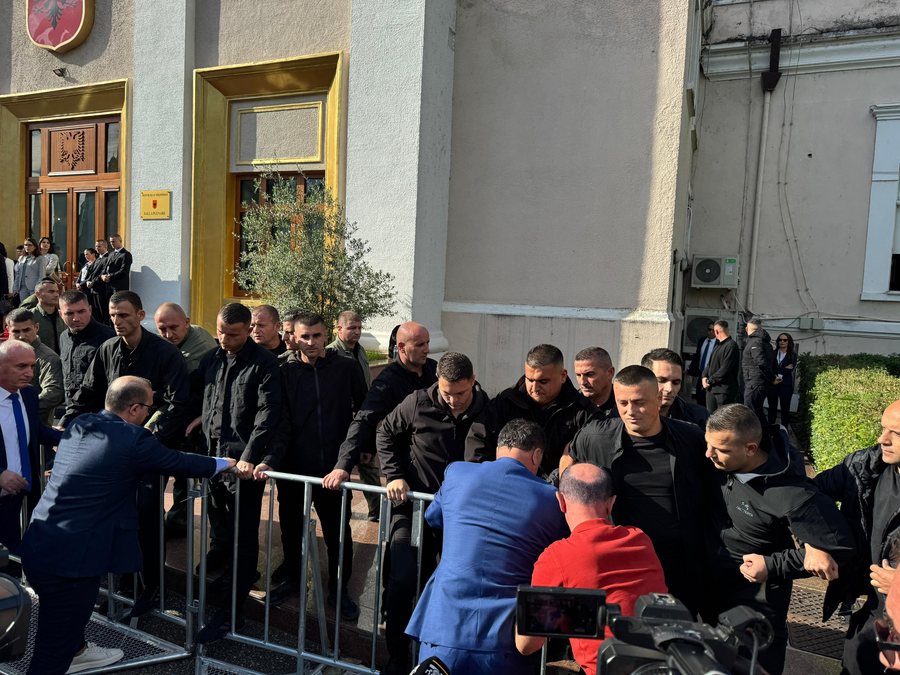Opposition MPs engage in violence inside and outside Parliament trying to disrupt parliamentary session

Thursday’s parliamentary session in Albania was marked by confrontations inside and outside the chamber, as Democratic Party (PD) MPs tried to force their way into Parliament through violent charges. Members of the Guard of the Republic were ordered to block Democratic MPs who had been suspended for 40 days following violent incidents during the September 30 session when they burned chairs and attacked their Socialist colleagues. Some opposition MPs managed to breach the police cordon and disrupt the session, leading to heated clashes inside the chamber.
Why is this important: The opposition’s escalation of violent actions and disruptions in Parliament appears to be closely tied to the ongoing legal troubles of Sali Berisha, the Democratic Party’s (DP) leader. Just yesterday, SPAK (Special Structure Against Corruption and Organized Crime) announced the conclusion of its investigation into Berisha and his son-in-law, with both facing corruption charges. Berisha who is under house arrest is currently awaiting trial.
However, despite its best efforts to provoke protests against the government and mobilize support, DP is showing signs of losing public support, as recent violent protests have failed to attract significant participation from citizens and have been reduced to small but violent crowds that engage in confrontations with police or attack institutions. Many view these violent tactics as a desperate attempt by the opposition to stay relevant amidst declining influence and limited political strategy. The actions of the DP’s MPs suggest that the party may be running out of ideas and resorting to confrontational politics, raising concerns about political stability and the functioning of democratic institutions in Albania.
Inside the Parliament:
Opposition MPs resorted to extreme measures to prevent normal proceedings:
- Chairs were barricaded near the speaker’s podium, halting discussions.
- Microphones were ripped out from socialist MPs.
- An interpellation with the Environment Minister requested by a fellow right-wing MP was blocked.
- The opposition also prevented the State Audit Director from presenting his annual report.
In one particularly tense moment, a Democratic MP threw an unidentified liquid solution at members of the ruling majority. The speaker of Parliament announced that an investigation had been launched to determine the contents of the liquid. “This is an unacceptable act that endangered the safety of MPs,” she said said. Meanwhile, the Minister of Interior declared that criminal charges would be filed against the MP responsible.
After these incidents, Democratic MPs walked out of the chamber, allowing socialist MPs to vote on the day’s agenda without further interruptions.
Clashes outside Parliament: Following their departure from the session, Democratic MPs joined by several hundred supporters, who had gathered in front of Parliament. Clashes soon erupted between protesters and members of the Guard of the Republic and the Rapid Intervention Police (FNSH). During the scuffle, PD MPs accused a police officer of threatening them with a service weapon.
A video aired by local media captured the moment in question during a chaotic confrontation between MPs and officers. In the footage, two MPs are seen physically assaulting a police officer, removing his hat and attempting to grab his protective helmet. The officer instinctively reaches for his right side, which MPs interpreted as a threat to draw a weapon. Democratic MP Gazment Bardhi stated, “An officer drew his weapon against MPs Bledion Nallbati and Luan Baçi, threatening to shoot them inside Parliament’s premises.”
The State Police denied these allegations, issuing a statement that officers on duty were not carrying firearms. The police clarified that only protective equipment and rubber batons were issued for the protest, as per law enforcement protocols. A video released by the police showed the officer in question carrying a pepper spray can instead of a firearm. Further media reports clarified that the policeman had been reaching for his can.
“The State Police fully comply with the law on public gatherings and confirm that no officer carried a firearm during the protest,” the police stated.
Legal fallout: The confrontation has triggered a wave of criminal complaints from both sides.
- The Democratic Party announced it would file criminal charges with SPAK (the Special Structure Against Corruption and Organized Crime) against the Speaker of Parliament, the Minister of Interior, and senior police officials, accusing them of allowing armed personnel to enter Parliament grounds and threaten MPs.
- On the other hand, the State Police declared that they would press charges against opposition MPs who engaged in violent acts against officers during the protest.
“All those responsible for assaulting police officers will be held accountable and referred to the prosecutor’s office,” the police stated in their official response.
Timeline: The conflict began immediately after Thursday’s parliamentary session, where suspended MPs were barred from entry. Protesters led by Democratic supporters, who had gathered at Tirana’s City Hall, moved toward Parliament and clashed with police officers stationed outside. Attempts to force open the entrance were met with resistance from security forces. FNSH units then entered the courtyard through the rear gate, where several physical altercations with opposition MPs occurred. The Gard intervened shortly after, de-escalating the situation and removing FNSH units from the premises.


